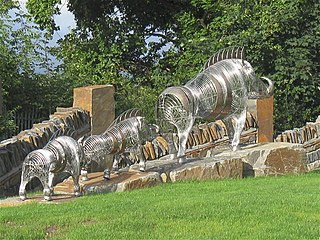Cyledr Wyllt (English: Cyledr the Wild) is a warrior and madman in Welsh mythology, known from the early Arthurian tale Culhwch and Olwen .

Welsh mythology consists of both folk traditions developed in Wales, and traditions developed by the Celtic Britons elsewhere before the end of the first millennium. Like most predominately oral societies found in the prehistoric Britain, Welsh mythology and history was recorded orally by specialists such as druids. This oral record has been lost or altered as result of outside contact and invasion over the years. Much of this altered mythology and history are preserved in medieval Welsh manuscripts which include the Red Book of Hergest, the White Book of Rhydderch, the Book of Aneirin and the Book of Taliesin. Other works connected to Welsh mythology include the ninth century Latin historical compilation Historia Brittonum and Geoffrey of Monmouth's twelfth-century Latin chronicle, Historia Regum Britanniae as well as later folklore such as the 1908 The Welsh Fairy Book by William Jenkyn Thomas.
Culhwch and Olwen is a Welsh tale that survives in only two manuscripts about a hero connected with Arthur and his warriors: a complete version in the Red Book of Hergest, ca. 1400, and a fragmented version in the White Book of Rhydderch, ca. 1325. It is the longest of the surviving Welsh prose tales. The prevailing view among scholars was that the present version of the text was composed by the 11th century, making it perhaps the earliest Arthurian tale and one of Wales' earliest extant prose texts, but a 2005 reassessment by linguist Simon Rodway dates it to the latter half of the 12th century. The title is a later invention and does not occur in early manuscripts.
Cyledr is named as one of the warriors who joins Gwythyr ap Greidawl's failed attack on love rival Gwyn ap Nudd and is imprisoned by the enemy following the conflict, alongside his father Nwython and several others. Gwyn later murders Nwython and, subsequently, forces Cyledr to eat his father's heart. After sustaining such torture at his captive's hands, Cyledr went mad, thus earning the epithet Gwyllt.
In Welsh mythology, Gwythyr ap Greidawl was a rival of Gwyn ap Nudd, a deity connected with the otherworld. In the Middle Welsh prose tale Culhwch ac Olwen, he is named as a member of Arthur's retinue and takes part in the quest to win the hand of Olwen for Arthur's cousin, Culhwch. Gwthyr would join Arthur on a journey to Pennant Gofid in Hell to retrieve the blood of the witch Orddu. His father is Greidawl Galldonyd, a fellow knight in Arthur's court. In Bonedd yr Arwyr, his genealogy is given as Gwythyr son of Greidawl the son of Enfael the son of Deigyr the son of Dyfnwal the son of Ednyfed the son of Maxen the son of Llywelyn. The Welsh Triads name him as the father of Arthur's second wife, also named Gwenhwyfar.

Gwyn ap Nudd is a Welsh mythological figure, the king of the Tylwyth Teg or "fair folk" and ruler of the Welsh Otherworld, Annwn, and whose name means “white son of Nudd”. Described later on as a great warrior with a "blackened face", Gwyn is intimately associated with the otherworld in medieval Welsh literature, and is associated with the international tradition of the Wild Hunt.
Later in the tale, Arthur heads north to find Cyledr, and eventually catches him. Cyledr later assists Arthur in the hunting of Twrch Trwyth and is personally responsible for retrieving the shears from the boar.

King Arthur was a legendary British leader who, according to medieval histories and romances, led the defence of Britain against Saxon invaders in the late 5th and early 6th centuries. The details of Arthur's story are mainly composed of folklore and literary invention, and his historical existence is debated and disputed by modern historians. The sparse historical background of Arthur is gleaned from various sources, including the Annales Cambriae, the Historia Brittonum, and the writings of Gildas. Arthur's name also occurs in early poetic sources such as Y Gododdin.

Twrch Trwyth (Welsh pronunciation: [tuːɾχ tɾʊɨθ]; also Trwyd, Troynt (MSS.HK); Troit (MSS.C1 D G Q); or Terit (MSS. C2 L)) is an enchanted wild boar in the Matter of Britain that King Arthur or his men pursued with the aid of Arthur's dog Cavall (Welsh: Cafall, Latin: Cabal).





